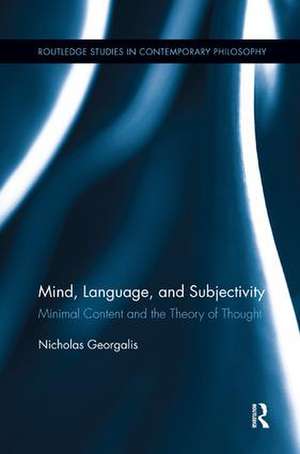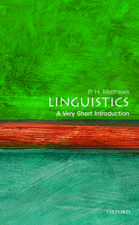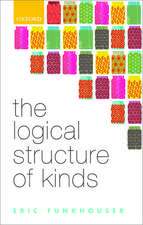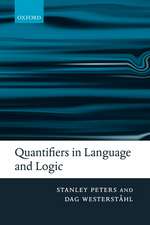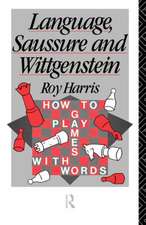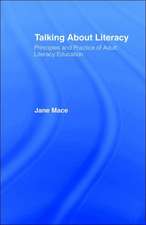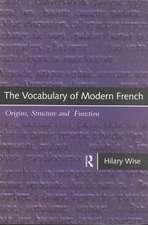Mind, Language and Subjectivity: Minimal Content and the Theory of Thought: Routledge Studies in Contemporary Philosophy
Autor Nicholas Georgalisen Limba Engleză Paperback – 28 noi 2017
| Toate formatele și edițiile | Preț | Express |
|---|---|---|
| Paperback (1) | 449.41 lei 6-8 săpt. | |
| Taylor & Francis – 28 noi 2017 | 449.41 lei 6-8 săpt. | |
| Hardback (1) | 1059.80 lei 6-8 săpt. | |
| Taylor & Francis – 23 oct 2014 | 1059.80 lei 6-8 săpt. |
Din seria Routledge Studies in Contemporary Philosophy
-
 Preț: 310.31 lei
Preț: 310.31 lei -
 Preț: 309.90 lei
Preț: 309.90 lei -
 Preț: 311.22 lei
Preț: 311.22 lei -
 Preț: 304.04 lei
Preț: 304.04 lei -
 Preț: 310.88 lei
Preț: 310.88 lei - 9%
 Preț: 903.32 lei
Preț: 903.32 lei - 8%
 Preț: 391.85 lei
Preț: 391.85 lei - 9%
 Preț: 1003.54 lei
Preț: 1003.54 lei -
 Preț: 312.90 lei
Preț: 312.90 lei -
 Preț: 313.34 lei
Preț: 313.34 lei -
 Preț: 310.16 lei
Preț: 310.16 lei -
 Preț: 307.69 lei
Preț: 307.69 lei - 9%
 Preț: 936.25 lei
Preț: 936.25 lei -
 Preț: 311.41 lei
Preț: 311.41 lei -
 Preț: 310.84 lei
Preț: 310.84 lei -
 Preț: 311.41 lei
Preț: 311.41 lei -
 Preț: 381.07 lei
Preț: 381.07 lei - 9%
 Preț: 934.94 lei
Preț: 934.94 lei - 9%
 Preț: 1038.15 lei
Preț: 1038.15 lei - 18%
 Preț: 1114.98 lei
Preț: 1114.98 lei - 18%
 Preț: 1112.21 lei
Preț: 1112.21 lei - 18%
 Preț: 1058.43 lei
Preț: 1058.43 lei - 18%
 Preț: 1055.51 lei
Preț: 1055.51 lei -
 Preț: 387.16 lei
Preț: 387.16 lei - 18%
 Preț: 1120.20 lei
Preț: 1120.20 lei - 18%
 Preț: 1057.13 lei
Preț: 1057.13 lei - 18%
 Preț: 1117.77 lei
Preț: 1117.77 lei - 18%
 Preț: 1058.69 lei
Preț: 1058.69 lei - 18%
 Preț: 1108.73 lei
Preț: 1108.73 lei - 18%
 Preț: 1111.55 lei
Preț: 1111.55 lei - 18%
 Preț: 1051.90 lei
Preț: 1051.90 lei - 18%
 Preț: 1109.78 lei
Preț: 1109.78 lei - 18%
 Preț: 1110.11 lei
Preț: 1110.11 lei - 18%
 Preț: 1052.35 lei
Preț: 1052.35 lei - 18%
 Preț: 1055.32 lei
Preț: 1055.32 lei -
 Preț: 481.58 lei
Preț: 481.58 lei - 18%
 Preț: 1111.87 lei
Preț: 1111.87 lei - 18%
 Preț: 1113.16 lei
Preț: 1113.16 lei - 18%
 Preț: 1115.69 lei
Preț: 1115.69 lei - 18%
 Preț: 1061.57 lei
Preț: 1061.57 lei - 18%
 Preț: 1053.95 lei
Preț: 1053.95 lei - 18%
 Preț: 1117.43 lei
Preț: 1117.43 lei - 18%
 Preț: 1059.84 lei
Preț: 1059.84 lei - 18%
 Preț: 1062.98 lei
Preț: 1062.98 lei - 18%
 Preț: 1064.70 lei
Preț: 1064.70 lei - 18%
 Preț: 1221.12 lei
Preț: 1221.12 lei - 18%
 Preț: 1108.24 lei
Preț: 1108.24 lei - 18%
 Preț: 1119.16 lei
Preț: 1119.16 lei - 18%
 Preț: 1060.25 lei
Preț: 1060.25 lei - 18%
 Preț: 897.16 lei
Preț: 897.16 lei
Preț: 449.41 lei
Nou
Puncte Express: 674
Preț estimativ în valută:
85.100€ • 90.01$ • 71.57£
85.100€ • 90.01$ • 71.57£
Carte tipărită la comandă
Livrare economică 31 martie-14 aprilie
Preluare comenzi: 021 569.72.76
Specificații
ISBN-13: 9780815371922
ISBN-10: 0815371926
Pagini: 280
Dimensiuni: 152 x 229 mm
Greutate: 0.45 kg
Ediția:1
Editura: Taylor & Francis
Colecția Routledge
Seria Routledge Studies in Contemporary Philosophy
Locul publicării:Oxford, United Kingdom
ISBN-10: 0815371926
Pagini: 280
Dimensiuni: 152 x 229 mm
Greutate: 0.45 kg
Ediția:1
Editura: Taylor & Francis
Colecția Routledge
Seria Routledge Studies in Contemporary Philosophy
Locul publicării:Oxford, United Kingdom
Public țintă
Postgraduate and UndergraduateCuprins
1. Minimal Content and Intentionality 2. More on Minimal Content and Related Issues 3. Thinking Differently about Thought and Language 4. The Superiority of the New Theory to Frege’s 5. Kripke’s Puzzle about Belief Solved 6. Use, Idiolect, and Statement Made 7. Speaker’s Referent 8. Speaker’s Referent and the Referential/Attributive Distinction 9. Proper Names 10. Solutions to Classic Problems 11. Securing Determinate Meaning—Part I: Against Kripkenstein 12. Securing Determinate Meaning—Part II: Against Quine
Recenzii
'Philosophical conversations tend to wear deep ruts into the intellectual landscape, and the continuations of these conversations often have a hard time finding their way out of these ruts. In the case of meaning…there are problematic assumptions to the effect (1) that there is something called "meaning" or "content" that can be attributed univocally to thought-tokens and utterances (much less sentences), and (2) that an analysis of "meaning" should be restricted to facts accessible from a third-person perspective….This book stands out as one of the few things I’ve read to take on these assumptions in a sustained fashion, proposes an alternative that distinguishes the content of thought-tokens from linguistic meaning, and does so in a way that emphasizes the uniquely first-person element of minimal content. This makes it, in my opinion, an important and much-needed book.' -- Steven Horst, Wesleyan University, USA
'As mentioned at the beginning of this review, there is an increasing number of philosophers who reject externalism. Georgalis's framework stands out as a bold and original alternative. The insistence that we need to take the first-person perspective seriously is powerfully motivated.' - Joe Y.F. Lau, The University of Hong Kong, Notre Dame Philosophical Reviews
'As mentioned at the beginning of this review, there is an increasing number of philosophers who reject externalism. Georgalis's framework stands out as a bold and original alternative. The insistence that we need to take the first-person perspective seriously is powerfully motivated.' - Joe Y.F. Lau, The University of Hong Kong, Notre Dame Philosophical Reviews
Descriere
This monograph further develops Georgalis' important work on minimal content, recasting and providing novel solutions to several of the fundamental problems faced by philosophers of language. His theory defends the importance of thought-tokens and minimal content and their many-to-one relation to linguistic meaning.
